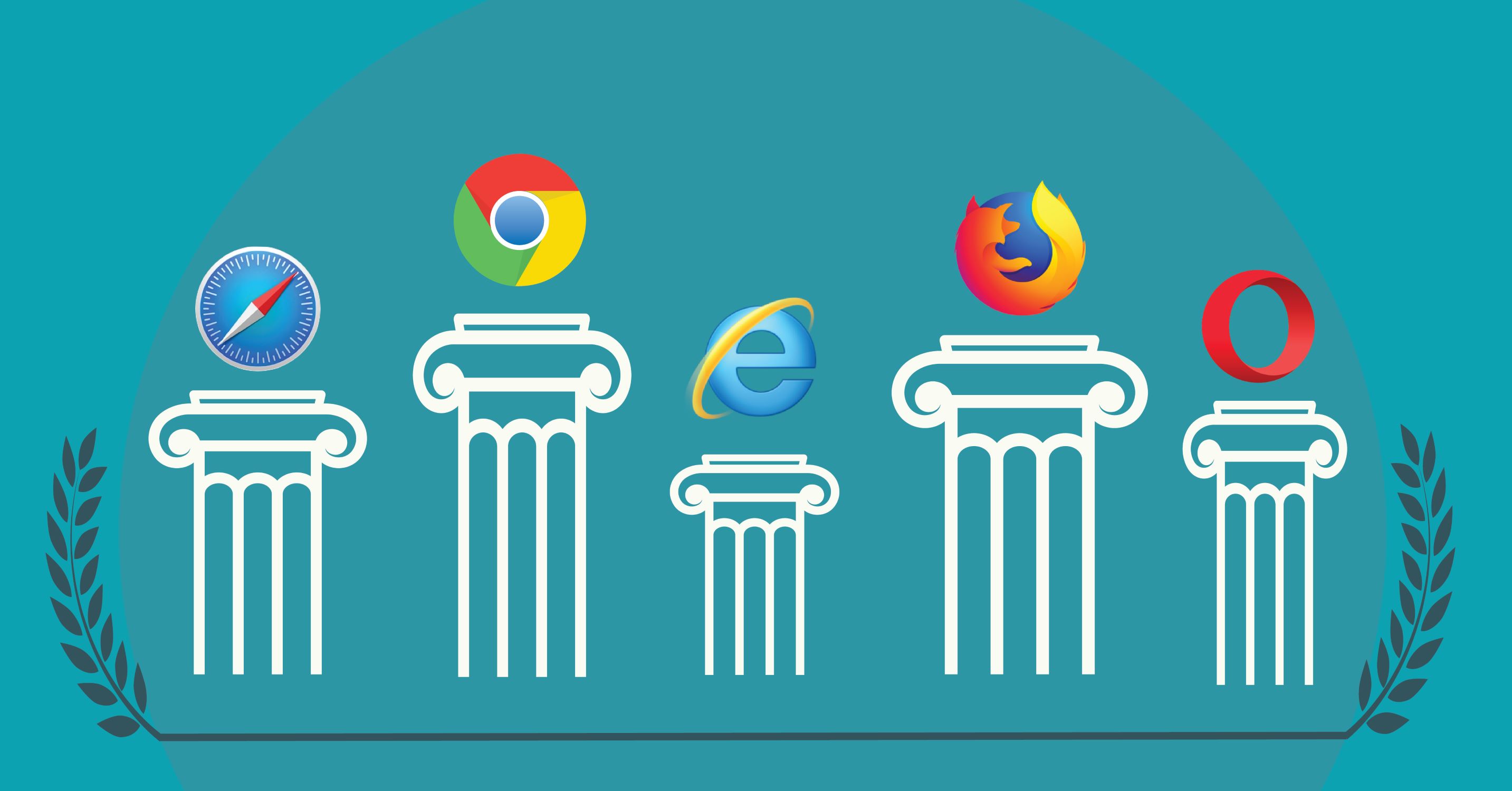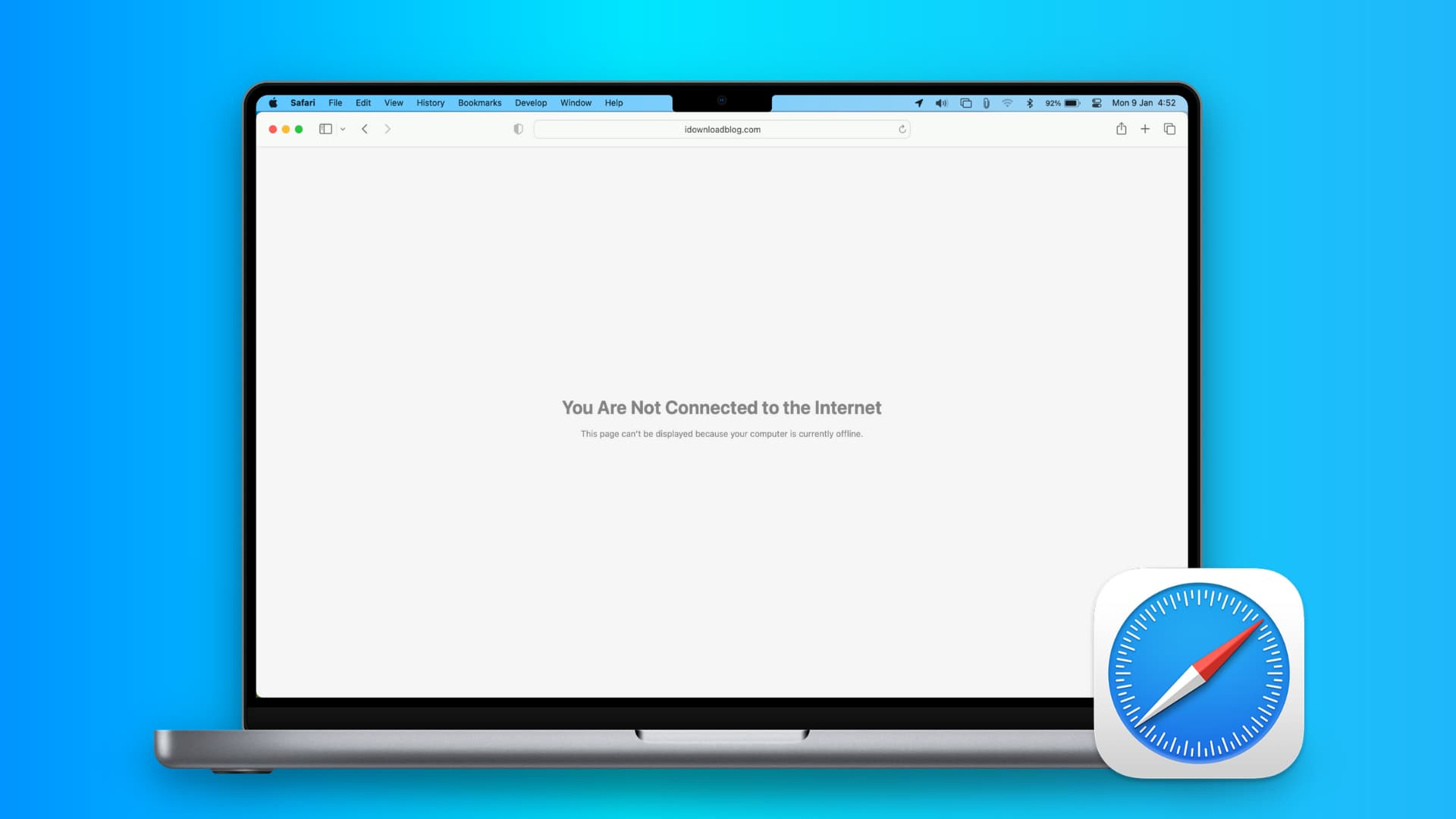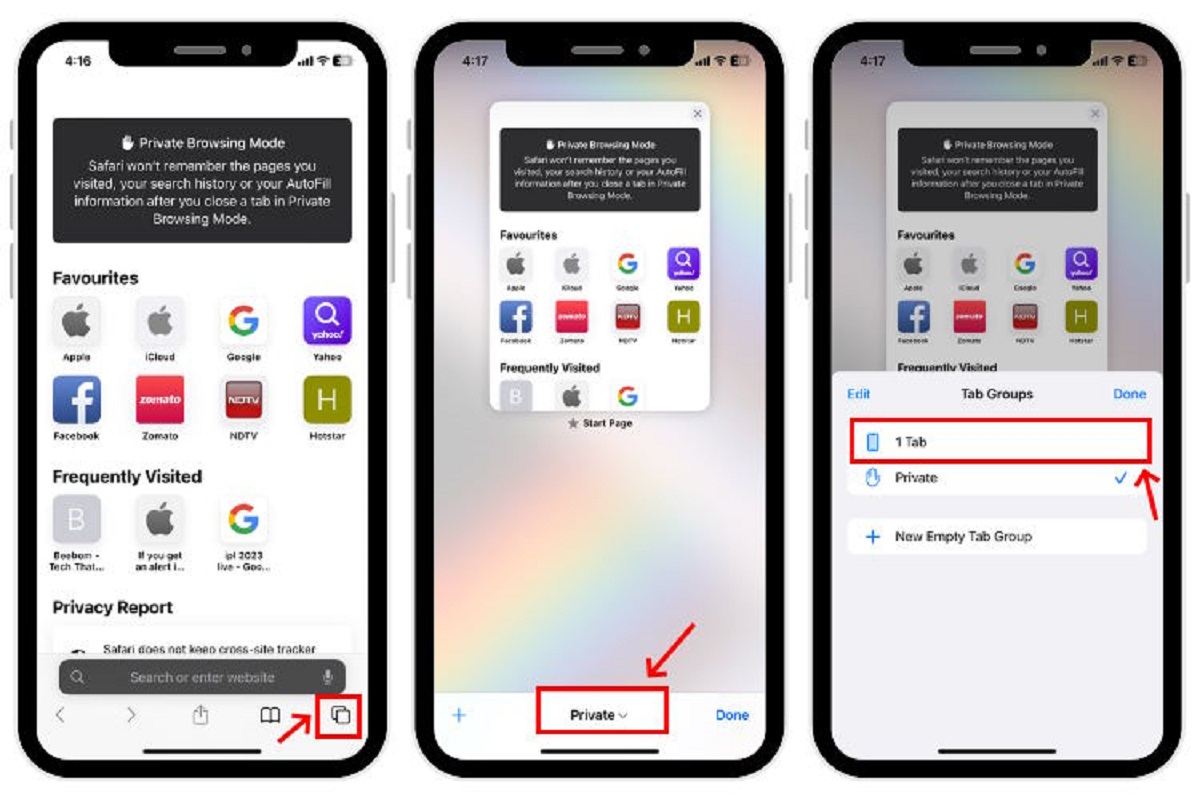Introduction
An internet browser, also known as a web browser, is a software application that allows users to access and view websites on the World Wide Web. It acts as a gateway between the user and the internet, providing a user-friendly interface for browsing and navigating through web pages.
With the ever-increasing importance of the internet in our daily lives, choosing the best internet browser becomes crucial. The performance, features, and security of the browser can significantly impact our browsing experience and overall online safety.
However, with a wide range of internet browsers available, each offering unique features and capabilities, selecting the right one can be a daunting task. In this article, we’ll explore the factors to consider when choosing an internet browser and compare some of the most popular options available.
When it comes to choosing an internet browser, it’s essential to consider your specific needs and preferences. Factors such as speed, security, user interface, compatibility, and additional features play a significant role in determining the best browser for your browsing habits.
In the following sections, we’ll delve into the key factors to consider when choosing an internet browser and compare various options to help you make an informed decision.
What is an internet browser?
An internet browser, or web browser, is a software application that allows users to access, view, and interact with websites on the internet. It acts as a virtual gateway, enabling users to navigate through web pages and access various online resources.
At its core, an internet browser functions as a translator between the user and the web. When you enter a website’s URL or click on a link, the browser communicates with servers around the world, retrieves the requested web page’s data, and displays it on your screen in a readable format.
The browser’s interface typically consists of a search/address bar, navigation buttons (e.g., back, forward, refresh), bookmarks, and tabs for multitasking. It provides a user-friendly environment and various tools to enhance your browsing experience.
Furthermore, internet browsers support a variety of web technologies, such as HTML, CSS, JavaScript, and plugins, ensuring that web pages are rendered accurately and efficiently. They interpret and execute scripts, handle multimedia content, and enable interactive features like forms, videos, and animations.
Today, there are numerous internet browsers available, each developed by different companies with their own unique features, strengths, and weaknesses. Some popular examples include Google Chrome, Mozilla Firefox, Microsoft Edge, Safari, and Opera.
Internet browsers have evolved over the years, becoming more robust, secure, and feature-rich. They strive to provide users with faster page loading times, improved privacy and security measures, customizable interfaces, and seamless integration with various online services.
Overall, an internet browser is an essential tool for anyone who uses the internet. It allows you to explore the vast online landscape, access information, communicate, and engage with web-based applications and services. Choosing the right browser can significantly impact your browsing experience, productivity, and even your online safety.
Factors to consider when choosing an internet browser
With a wide range of internet browsers available, it’s important to consider several factors before making your decision. Here are some key factors to consider when choosing an internet browser:
- Speed and performance: One of the most crucial considerations is how fast and responsive the browser is. Look for a browser that can handle web pages efficiently and load them quickly.
- User interface and customization: Consider the user interface and how customizable it is. A browser with an intuitive layout and customizable options allows you to tailor your browsing experience according to your preferences.
- Compatibility: Ensure that the browser you choose is compatible with your operating system. Most browsers are designed to work on multiple platforms, including Windows, macOS, Linux, and mobile operating systems like iOS and Android.
- Security and privacy: Internet security is of utmost importance. Look for a browser that offers robust security measures, such as built-in phishing and malware protection, automatic updates, and strong encryption for secure browsing. Additionally, consider the privacy features offered by the browser, such as the ability to block tracking cookies, use of private browsing modes, and options for controlling data sharing.
- Extensions and additional tools: Some browsers offer a wide range of extensions and add-ons that can enhance your browsing experience. Check if the browser supports the extensions you need, such as ad blockers, password managers, or productivity tools.
Keep in mind your own browsing habits and requirements when evaluating these factors. For example, if you heavily rely on certain web applications or services, make sure the browser you choose is compatible and works seamlessly with them.
Additionally, consider reading user reviews and conducting a trial period with different browsers to get a firsthand experience of their performance and features. What may work great for one person may not be the best choice for another, so it’s essential to find a browser that aligns with your specific needs and preferences.
Popular internet browsers
When it comes to internet browsers, there are several popular options that have gained widespread recognition and are used by millions of people worldwide. Let’s take a closer look at some of the most popular internet browsers available:
- Google Chrome: Developed by Google, Chrome is one of the most widely used browsers in the world. It is renowned for its speed, security, and simplicity. Chrome offers a user-friendly interface, a wide range of extensions, and seamless integration with other Google services.
- Mozilla Firefox: Firefox is an open-source browser known for its robust privacy features and customization options. It provides a fast and secure browsing experience and offers various extensions and themes to personalize your browser.
- Microsoft Edge: Edge is the default browser for Windows 10 and is built on the Chromium engine. It offers a streamlined user interface, improved performance, and compatibility. Edge also integrates seamlessly with Microsoft services and has advanced privacy features.
- Safari: Safari is the default web browser for Apple devices, including Mac, iPhone, and iPad. It is known for its speed and efficiency, offering a seamless browsing experience with excellent optimization for Apple’s ecosystem.
- Opera: Opera is a lesser-known browser but is highly regarded for its speed and innovative features. It offers a range of tools such as a built-in ad blocker, free VPN, and customizable sidebar for quick access to bookmarks and extensions.
These browsers are constantly updated and improved to provide better performance, enhanced security, and additional features. Each browser has its own unique strengths and weaknesses, so it’s important to consider your specific needs and preferences when choosing the right one for you.
Remember, popularity doesn’t necessarily mean the browser is the best fit for everyone. It’s worth exploring different browsers and conducting your own research to find the one that suits your browsing habits and requirements the most.
Comparison of popular internet browsers
While there are many internet browsers available, it can be helpful to compare some of the most popular options to see the similarities and differences between them. Here’s a comparison of popular internet browsers:
- Google Chrome: Chrome is known for its speed and performance, especially when it comes to loading web pages and running web applications. It offers a clean and user-friendly interface with seamless integration with Google services. Chrome also provides a wide range of extensions and a thriving developer community.
- Mozilla Firefox: Firefox focuses on privacy and security, with features like Enhanced Tracking Protection and options for blocking third-party cookies. It also offers customization options and a vast library of add-ons and extensions. Firefox prides itself on being an open-source browser developed with user privacy in mind.
- Microsoft Edge: Edge offers a simplified user interface and improved speed compared to its predecessor, Internet Explorer. It is compatible with different operating systems and has strong integration with other Microsoft products. Edge also provides features like Tracking Prevention and offers a built-in reading mode.
- Safari: Safari is known for its excellent performance and efficient power usage on Apple devices. It offers a smooth browsing experience and tight integration with the Apple ecosystem. Safari emphasizes privacy with features like Intelligent Tracking Prevention and offers seamless syncing across devices.
- Opera: Opera is known for its speed and range of built-in features. It offers a free VPN, ad blocker, and customizable sidebar, making it an all-in-one solution for a seamless browsing experience. Opera also supports Chrome extensions, providing flexibility and customization options.
Keep in mind that this is just a general comparison, and individual experiences and preferences may vary. It’s essential to consider factors such as speed, security, customization options, and compatibility with your operating system when choosing the right browser for your needs.
Ultimately, the best internet browser for you depends on your personal preferences, browsing habits, and the specific features that are important to you. It may be worth trying out different browsers and seeing which one fits your requirements and provides the most enjoyable and efficient browsing experience.
Key features of popular internet browsers
Popular internet browsers offer a wide range of features that enhance the browsing experience and cater to different user preferences. Here are some key features of popular internet browsers:
- Speed and performance: Many browsers prioritize speed and performance, aiming to load web pages quickly and navigate seamlessly between multiple tabs and windows.
- User interface and customization: Browsers offer various user interfaces, from minimalist designs to customizable layouts. Users can often modify themes, rearrange toolbars, and personalize their browsing experience.
- Security and privacy: Browsers focus on providing a secure and private browsing environment through features like anti-tracking measures, phishing protection, automatic updates, and incognito modes.
- Tab management: Browsers allow users to open multiple tabs, organizing them efficiently and providing options for tab previews, grouping, and tab management extensions.
- Extensions and add-ons: Many browsers have dedicated extension marketplaces, offering an array of add-ons to enhance functionality. These extensions can range from ad blockers and password managers to productivity tools and note-taking applications.
- Syncing and cross-device support: Browsers often provide syncing capabilities across devices, allowing users to access bookmarks, history, passwords, and settings seamlessly from their desktop, laptop, or mobile devices.
- Developer tools: Browsers come equipped with developer-oriented features, including web console, error debugging tools, page inspection, and network analysis, enabling developers to build and optimize websites.
- Integration with other services: Some browsers offer seamless integration with other services and platforms. For example, integration with email clients, cloud storage, and social media platforms to streamline productivity and information sharing.
These key features are found in various combinations across popular internet browsers. It’s important to consider which features are most important to you and align with your browsing habits and needs.
Remember, browsers constantly evolve and add new features, so staying updated with the latest versions and features can ensure you have the best browsing experience possible.
Security and privacy considerations
When choosing an internet browser, security and privacy should be among your top priorities. Here are some key security and privacy considerations to keep in mind:
- Phishing and malware protection: Look for a browser that offers built-in protection against phishing attempts and malware. These features help prevent you from accessing malicious websites or downloading harmful files.
- Encryption and HTTPS support: Ensure your browser supports secure connections using HTTPS and utilizes encryption to safeguard your data when browsing websites.
- Privacy settings: Check if the browser offers privacy settings that allow you to control how your data is collected and used. Look for features like blocking third-party cookies, preventing tracking, and the ability to use a private browsing mode.
- Automatic updates: Regular updates are crucial for maintaining browser security. Select a browser that provides automatic updates to ensure you have the latest security patches and improvements.
- Password management: Consider browsers that offer built-in password managers or compatibility with reputable password management tools. This feature helps you create and store strong, unique passwords for your online accounts.
- Clear browsing data: Look for options to easily clear your browsing history, cookies, cached files, and other stored data. This helps protect your privacy and removes traces of your online activities.
- Extensions and add-ons: Be cautious when installing extensions or add-ons from unknown sources. Stick to trusted marketplaces and verify the permissions required by the extensions to ensure they don’t compromise your security or privacy.
Additionally, consider researching the browser’s security track record and how quickly security vulnerabilities are addressed by the development team. Look for browsers that have a strong focus on security and regularly undergo security audits.
Remember that no browser can guarantee 100% security or complete privacy. It’s always recommended to practice safe browsing habits, such as being cautious of suspicious websites and links, using strong, unique passwords, and keeping your operating system and browser up to date.
By selecting a browser that emphasizes security and privacy, you can significantly reduce your exposure to online threats and enjoy a safer browsing experience.
Speed and performance
When it comes to internet browsing, speed and performance are key factors that greatly impact the user experience. Here are some aspects to consider when evaluating the speed and performance of an internet browser:
- Page loading time: A fast browser should load web pages quickly. Look for browsers that have optimized rendering engines and efficient caching mechanisms to minimize the time it takes to load websites.
- JavaScript execution: JavaScript is an integral part of modern web applications. Browsers with high-performance JavaScript engines can execute complex scripts more efficiently, leading to smoother interactions and enhanced performance.
- Memory usage: Browsers that consume excessive memory can slow down your computer and lead to a less responsive browsing experience. Opt for browsers that are designed to be memory-efficient and manage system resources effectively.
- Tab and resource management: If you frequently use multiple tabs, look for browsers that handle tab management well. Browsers that prioritize active tabs over inactive ones can help maintain a smooth experience even with multiple tabs open.
- Hardware acceleration: Browsers that leverage hardware acceleration can offload certain graphical calculations to your device’s GPU, resulting in accelerated rendering and overall better performance.
- Reduced resource consumption: Some browsers offer features like ad blockers or tracking prevention mechanisms to reduce the amount of unnecessary content and scripts that load on a page, resulting in faster loading times.
- Compatibility with web standards: Browsers that adhere to web standards, such as HTML, CSS, and JavaScript, tend to provide better performance as they are optimized to work seamlessly with modern web technologies.
It’s important to note that the speed and performance of a browser can vary depending on various factors, such as your internet connection, the complexity of the web page, and the resources required by the websites you visit.
If speed is a priority for you, consider conducting performance tests or reading reviews that compare browser performance under different scenarios. Real-world usage and individual hardware configurations can also impact the perceived speed and performance of a browser.
Ultimately, choosing a browser that strikes a balance between speed, performance, and other desirable features will ensure you have a smooth and efficient browsing experience.
User interface and customization options
The user interface and customization options of an internet browser play a crucial role in enhancing the user experience. Here are some key aspects to consider when evaluating the user interface and customization options of a browser:
- Layout and design: Look for a browser with a clean and intuitive user interface. A well-designed layout makes it easier to navigate and access various browser features and settings.
- Toolbar and menus: Consider the placement and customization options of toolbars and menus. Browsers that allow you to rearrange or hide unnecessary elements can provide a more streamlined and personalized browsing experience.
- Themes and appearance: Customization options like themes and appearance settings allow you to personalize the look and feel of the browser. Look for browsers that offer a variety of themes or have support for custom themes.
- Tab management: Efficient tab management is essential, especially if you frequently work with multiple tabs. Look for features like tab previews, tab grouping, and the ability to pin tabs for easy access and organization.
- Bookmarks and history: A browser with a user-friendly bookmark manager and a comprehensive browsing history makes it easier to save and organize websites for quick access in the future.
- Keyboard shortcuts: Look for browsers that offer customizable keyboard shortcuts. This enables you to perform common tasks quickly and efficiently, improving your overall browsing productivity.
- Gestures and mouse shortcuts: Some browsers support gestures and mouse shortcuts, allowing you to perform actions with a swipe or a specific mouse gesture. These features can streamline navigation and improve browsing efficiency.
- Syncing and account integration: If you use multiple devices, consider browsers that offer syncing capabilities and account integration. This ensures that your bookmarks, history, passwords, and other settings are seamlessly shared across your devices.
Customization options are important to tailor your browsing experience to your specific needs and preferences. They allow you to create a comfortable and personalized environment, improving productivity and making browsing more enjoyable.
Remember, the level of customization may vary between browsers. Some browsers offer a wide range of customization options, while others have a simpler interface. Consider your specific requirements and choose a browser that offers the right balance of customization options and ease of use.
By selecting a browser with a user-friendly interface and ample customization options, you can create a browsing environment that suits your preferences and enhances your overall experience.
Compatibility with different operating systems
When choosing an internet browser, it’s crucial to consider its compatibility with different operating systems. Here are key factors to consider:
- Windows: Most popular browsers, including Google Chrome, Mozilla Firefox, Microsoft Edge, and Opera, offer dedicated versions for Windows. These browsers are extensively tested and optimized for Windows operating systems, providing seamless compatibility.
- macOS: Browsers like Safari, Google Chrome, Mozilla Firefox, and Opera offer versions specifically designed for macOS. These browsers take advantage of macOS features and optimizations to provide a seamless and integrated browsing experience.
- Linux: Several browsers, such as Google Chrome, Mozilla Firefox, Opera, and Chromium, offer native support for various Linux distributions. These browsers are built and tested to ensure optimal performance and compatibility on Linux-based systems.
- iOS and iPadOS: If you use an iPhone or iPad, consider browsers like Safari, Google Chrome, Mozilla Firefox, and Microsoft Edge, which have versions specifically designed for iOS and iPadOS. These browsers offer seamless integration with Apple’s ecosystem and take advantage of iOS-specific features.
- Android: Most popular browsers, including Google Chrome, Mozilla Firefox, Opera, and Microsoft Edge, offer versions tailored for Android devices. These browsers are optimized for the Android platform, providing compatibility and a smooth browsing experience on smartphones and tablets.
When selecting a browser, check if it supports the specific version of your operating system. Browsers are regularly updated to ensure compatibility with the latest operating system versions and provide bug fixes and performance improvements.
Additionally, consider if the browser offers a consistent experience across different operating systems. Some browsers strive to provide a unified user experience across multiple platforms, allowing you to seamlessly transition between devices and maintain your preferred settings and browsing data.
Ensuring compatibility with your operating system is essential for a smooth and hassle-free browsing experience. By choosing a browser compatible with your operating system, you can take full advantage of its features and enjoy optimal performance.
Additional tools and extensions
One of the advantages of modern internet browsers is the availability of additional tools and extensions that can enhance your browsing experience. Here are some key aspects to consider when evaluating the additional tools and extensions offered by different browsers:
- Ad blockers: Ad blocking extensions can help improve page loading times and provide a cleaner browsing experience by removing intrusive advertisements.
- Password managers: Browser-integrated or compatible password managers make it easier to generate, store, and manage strong, unique passwords for your online accounts.
- Developer tools: Browsers often include built-in developer tools, such as code editors, debugging consoles, network analyzers, and performance profilers, to assist web developers in their work.
- Privacy-focused extensions: There are various extensions available that focus on enhancing privacy by blocking tracking cookies, preventing fingerprinting, and encrypting your online communications.
- Note-taking and productivity tools: Some browsers offer extensions or integrated tools that allow you to take notes, create to-do lists, and boost your productivity by integrating with popular productivity apps.
- Content translation: Certain browsers provide built-in or extension-based translation tools that can translate web pages into different languages, enabling seamless browsing across language barriers.
- Screen capturing and annotation: Browser extensions that allow you to capture screenshots, record screencasts, and annotate images can be incredibly useful for sharing information or documenting web content.
- Social media integrations: Browsers may offer extensions or features that integrate with social media platforms, making it easier to share content, save articles for later, or stay updated with social media feeds.
When selecting a browser, consider your specific needs and the additional tools or extensions that would be most useful to you. Ensure that the browser supports the extensions you require or has an active ecosystem of developers creating useful browser add-ons.
Moreover, evaluate the quality and security of the extensions you install. Stick to reputable extension marketplaces and review the permissions required by each extension to ensure they won’t compromise your security or privacy.
By choosing a browser that offers a wide range of additional tools and extensions, you can customize your browsing experience and tailor it to your specific needs, ultimately enhancing your productivity and enjoyment while surfing the web.
Conclusion
Choosing the best internet browser is a personal decision that depends on your individual needs, preferences, and browsing habits. Factors such as speed, security, user interface, compatibility, and additional features all play a significant role in determining the browser that works best for you.
In this article, we discussed the importance of considering factors like speed and performance, user interface and customization options, security and privacy, compatibility with different operating systems, and the availability of additional tools and extensions.
Popular internet browsers such as Google Chrome, Mozilla Firefox, Microsoft Edge, Safari, and Opera offer a range of features and capabilities, each with its own strengths and weaknesses. It’s important to evaluate these browsers based on your specific requirements and preferences.
Ultimately, the best internet browser is the one that provides a seamless and secure browsing experience, offers the features you need, and aligns with your personal preferences. It’s recommended to experiment with different browsers, explore their features, and consider real-world usage scenarios before making a final decision.
Remember, the internet browser landscape is constantly evolving, with new features and improvements being introduced regularly. Staying informed about browser updates, security measures, and emerging technologies can help you make informed decisions and ensure that your browsing experience remains enjoyable, secure, and efficient.
By considering the factors discussed in this article and experimenting with different options, you can find the internet browser that meets your needs and provides a smooth and enjoyable experience as you navigate the vast landscape of the internet.

























